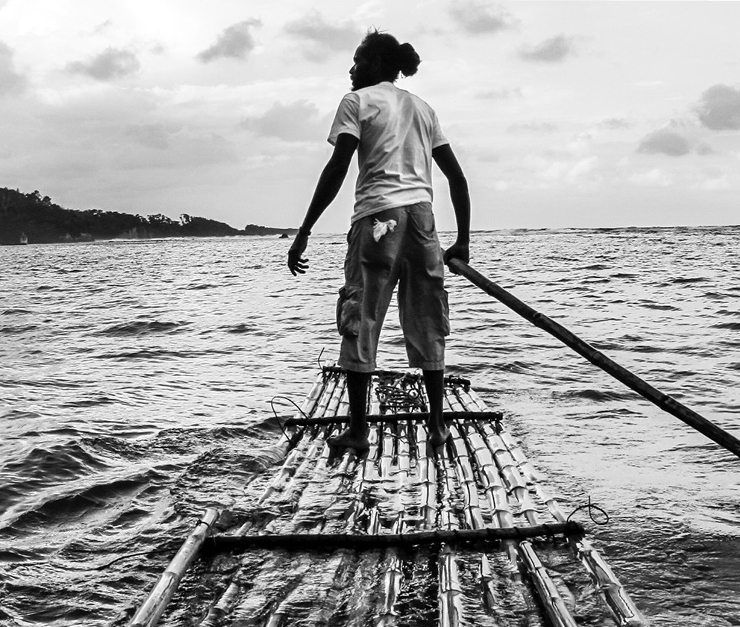Jamaica Discipline

Blue Lagoon, Port Antonio, Jamaica.
Think of Jamaica and you think relaxed, laid-back, carefree. But this widespread perception is at odds with the real culture of the island, where discipline is the prevalent value: as predictable a part of life as rice and peas or the rainy season.
I remember being on a bus in the capital, Kingston, watching an elderly woman come on board. There were no seats available, and eyes started to move to a young man who had remained seated. At first some heads turned and eyebrows raised. When that did not achieve the desired effect, someone called out to him: “I think you should get up bawy.” Which he finally did, muttering a “whatever” under his breath, and you might have expected that to be the end of it.
But the bus was not appeased and one woman decided she would go further. “Did your parents forget to teach you how to behave properly?” she scolded. And then the killer blow: “Ask yourself, how would you want your grandmother to be treated on a public bus?” By this point there wasn’t a single person on the bus who wasn’t watching the incident unfold. It was as if all the bus were acting as a member of his family—disciplining him as his parents, grandparents, aunts, and uncles would have.
The bravado had quickly disappeared, and the boy was blushing. My mouth was dry and I felt nervous for him. Given I remember the incident so clearly, I can only imagine how much of an impact it must have left on him.
The question about the boy’s grandmother was particularly telling, because of the central role that family plays in Jamaican life and especially in creating a collective culture of discipline.
Visiting a university friend of mine, and his young family, you couldn’t miss the very structured and strict routine that everyone followed. The children would wake up early on Monday morning, completing all their assigned chores before going to school. After making their bed, one would lay the table, the other helped prepare the breakfast, and the third would help with the washing up. They would depart for school looking pristine—uniforms ironed, ribbons in the girl’s hair, skirt at the mandated length.
Education is highly prized in Jamaica, but children are also expected to support their family in whatever their work may be, from helping with the animals if they are farmers, to helping sell goods if they are traders. In the summer, children might spend time with their grandparents, clearing the apple trees in the large orchards, and doing the same in neighboring orchards in return for a few apples to sell for pocket money. From a young age, you are taught about pulling your weight and picking up your responsibilities. As the Mama of the house where I stayed put it to me, in a very matter-of-fact way, “They have to help out, and do stuff—and if they cannot think of anything to do, then they should go and find something.” That disciplined attitude toward work and time management is one that, despite Jamaica’s laid-back reputation, continues for most throughout life.
Discipline is not just something that exists in the family context. It is also integral to Rastafari, the religious movement that began in 1930s Jamaica, and its concept of Livity: a natural way of living thought to enhance your inner energy and life force. This includes the Ital diet, one that scorns meat, alcohol, and processed foods and which in some cases is entirely vegan; letting the hair grow long and natural; and avoiding any piercings or tattoos, keeping the body in its natural form. Again, the cliché of the laid-back, freewheeling Rastaman is at odds with the reality of a culture that is highly disciplined and has strict rules about how to live. It is this core of discipline that underpins the free-spirited creativity that has made Rastafarians like Bob Marley, and reggae music, famous around the world.
The Jamaican culture of discipline is so powerful because of how widely it is enforced. As I witnessed on that bus ride, complete strangers will make a point of pulling back into line people who are not showing the expected discipline, especially youngsters. Although the immediate family unit is where children are taught the value of discipline, there is a society-wide embrace of the responsibility to ensure discipline is upheld. “I would look out for all the children on this island as if they were mine,” someone told me. “Many times that means to talk to them and discipline them as if they were my own, because I would want my children to receive the benefit of this from others also.”
When fairly enforced, there is a huge amount that Jamaica can teach us about the importance of discipline, and principally the way in which it shapes behavior. When you know there are going to be no consequences, it becomes easy to start ignoring or bending society’s rules, whether that is dropping litter or refusing to give up your seat on public transportation to someone who needs it. But when people around you will not tolerate such infringements, your behavior quickly changes. You start to self-police, to become more conscious of how you are acting and how others perceive you. Above all, you do not forget that, in everything you do, at all times, you represent not just yourself as a person but also the family that raised you.